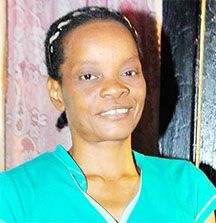(Trinidad Express) Public servant Cheryl Miller, who was taken from her workplace in 2012 and kept at the St Ann’s Psychiatric Hospital for more than two weeks before a High Court judge granted a writ of habeas corpus to have her released, was on Monday ordered by another judge to receive more than TT$800,000 in damages from the North West Regional Health Authority (NWRHA).

Justice Judith Jones delivered the judgment at the Hall of Justice in Port of Spain, ordering that the NWRHA pay Miller a total of TT$835,000 for her wrongful arrest and detention at the health institution. Four other defendants in the matter — the Attorney General, the permanent secretary and deputy permanent secretary of the Gender Affairs Ministry, and former minister of Gender Affairs, Youth and Child Development Verna St Rose-Greaves — were not found to be liable in the case.
The NWRHA now has 14 days in which to appeal the court’s ruling.
The judge ordered that Miller receive TT$450,000 in general damages, TT$75,000 in exemplary damages for the treatment she received at the health institution and TT$310,000 in legal fees owed to her attorneys Stanley Marcus SC and Fitzgerald Hinds.
‘’Everyone here is against me’
Miller, who was employed at the ministry as an accounting assistant, was forcibly removed from her desk on March 21, 2012, by employees of the NWRHA, placed in an ambulance and taken to the hospital where she spent 17 days before being released following the granting of the habeas corpus writ by Justice Vashiest Kokaram.
She was detained under section 15 of the Mental Health Act, which states: “A person found wandering at large on a highway or in any public place and who by reason of his appearance, conduct or conversation, a mental health officer has reason to believe is mentally ill and in need of care and treatment in a psychiatric hospital or ward, may be taken into custody and conveyed to such hospital or ward for admission for observation in accordance with this section.”
The Health Authority contended that its mental health officer, Koreen Jackson-Huggins, arrived at the conclusion that Miller was mentally ill given that Miller had a large black umbrella opened on her desk; she had on earphones from which emanated loud music; she appeared untidy, her clothes seemed soiled and her hair was unkempt.
Also the Health Authority contended Miller said in response to an enquiry as to the nature of her problem: “everyone here, everyone here is against me, it goes on everyday, everybody doing me things, they even coming by the window.”
Based on this, the Authority said Jackson-Huggins “became alarmed because if the claimant was seeing people speaking to her on the 21st floor, in her professional assessment of the situation it was possible that the claimant may have taken some drastic action which may have caused harm to herself or her co-workers.”
One of the issues that had to be clarified during the trial was whether the ministry’s office where Miller worked was a public place. Under the Act, a public place is defined as “any place to which the public has access with or without payment.”
Challenging situation
In her witness statement, Jackson-Huggins said she approached Jasmine Pascall, the Ministry’s Deputy Permanent Secretary and legal adviser, and informed her it was a “challenging situation” as she was only allowed to remove individuals from public places and was later advised that the office was in fact a public place. Jackson-Huggins admitted under cross-examination that she had doubts on whether the office was a public place but relied on Pascall’s advice.
In her 34-page judgment, Justice Jones said: “I am satisfied that there is no evidence upon which I can come to the conclusion that Miller’s cubicle at the Ministry’s offices was a public place. It was in the accounting department in an area surrounded by other cubicles occupied by other employees of the Ministry. It was a work area. Since the work of the accounting department was highly confidential it would seem to me to be hardly likely that this would be an area to which the public would have access.”
The judge further pointed out that given Miller was seated at her desk when taken away, it was clear that she was not wandering at large or at all. “While sitting at her desk Miller was wandering nowhere,” said the judge.
Justice Jones said the utterances made by Miller could not have allowed the conclusion that she was mentally ill. She said the conclusion arrived at by Jackson-Huggins was not that Miller was mentally ill and in need of care and treatment at the mental hospital but rather that she may have been a danger to herself and to her co-workers.
“Further even when combined with the fact of Miller’s appearance, the open umbrella on her desk and the headphones with loud music emanating, even if I accept the evidence, while it may suggest some eccentricity it does not in my opinion provide a reason to conclude that Miller was a danger to herself or to her co-workers as concluded by the officer, far less that she was suffering from mental illness and was in need of care and treatment at a psychiatric hospital or ward.
She said based on the evidence, she was satisfied that Miller would have been greatly humiliated and embarrassed by the manner of her arrest in the presence of her co-workers and in particular in the presence of those with whom she had a running dispute.
“This was further compounded by her being taken onto the public street and placed in an ambulance and even further aggravated by the widespread publicity that her apprehension and detention at the mental hospital attracted. The fact that calypsoes were composed and sung about her meant that the circumstances and manner of her detention were kept in the public eye thereby increasing and intensifying her humiliation and embarrassment,” said the judge.
